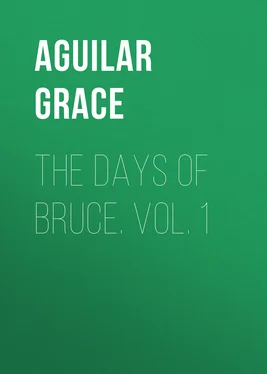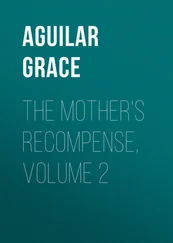Grace Aguilar - The Days of Bruce. Vol. 1
Здесь есть возможность читать онлайн «Grace Aguilar - The Days of Bruce. Vol. 1» — ознакомительный отрывок электронной книги совершенно бесплатно, а после прочтения отрывка купить полную версию. В некоторых случаях можно слушать аудио, скачать через торрент в формате fb2 и присутствует краткое содержание. Жанр: foreign_prose, История, foreign_edu, foreign_antique, на английском языке. Описание произведения, (предисловие) а так же отзывы посетителей доступны на портале библиотеки ЛибКат.
- Название:The Days of Bruce. Vol. 1
- Автор:
- Жанр:
- Год:неизвестен
- ISBN:нет данных
- Рейтинг книги:5 / 5. Голосов: 1
-
Избранное:Добавить в избранное
- Отзывы:
-
Ваша оценка:
- 100
- 1
- 2
- 3
- 4
- 5
The Days of Bruce. Vol. 1: краткое содержание, описание и аннотация
Предлагаем к чтению аннотацию, описание, краткое содержание или предисловие (зависит от того, что написал сам автор книги «The Days of Bruce. Vol. 1»). Если вы не нашли необходимую информацию о книге — напишите в комментариях, мы постараемся отыскать её.
The Days of Bruce. Vol. 1 — читать онлайн ознакомительный отрывок
Ниже представлен текст книги, разбитый по страницам. Система сохранения места последней прочитанной страницы, позволяет с удобством читать онлайн бесплатно книгу «The Days of Bruce. Vol. 1», без необходимости каждый раз заново искать на чём Вы остановились. Поставьте закладку, и сможете в любой момент перейти на страницу, на которой закончили чтение.
Интервал:
Закладка:
A muttered oath was all the reply which his companion vouchsafed, nor did the thunder-cloud upon his brow disperse that evening.
The careless recklessness of Fife had no power to lessen in the earl's mind the weight of the shameful charge he had brought against the countess. Buchan's dark, suspicious mind not alone received it, but cherished it, revelled in it, as giving him that which he had long desired, a good foundation for dislike and jealousy, a well-founded pretence for every species of annoyance and revenge. The Earl of Fife, who had, in fact, merely spoken, as he had said, to while away the time, and for the pleasure of seeing his brother-in-law enraged, thought as little of his words after as he had before they were uttered. A licentious follower of pleasure in every form himself, he imagined, as such thoughtless characters generally do, that everybody must be like him. From his weak and volatile mind, then, all remembrance of that evening's conversation faded as soon as it was spoken; but with the Earl of Buchan it remained brooding on itself, and filling his dark spirit with yet blacker fancies.
The confinement of the Scottish noblemen was not of long duration. Edward, whose temper, save when his ambition was concerned, was generally just and equitable, discovering, after an impartial examination, that they were in no ways connected with the affairs in the north, and feeling also it was his interest to conciliate the regard of all the Scottish nobles disaffected to Bruce, very soon restored them alike to their personal liberty and to his favor; his courteous apology for unjust suspicion, frankly acknowledging that the news from Scotland, combined with his irritating disease, had rendered him blind and suspicious, at once disarmed Fife of wrath. Buchan, perhaps, had not been so easily appeased had his mind been less darkly engrossed. His petition, that his son might be sent for, to be placed as a hostage in the hands of Edward, and thus saved from the authority of his mother, whom he represented as an artful, designing woman, possessed of dangerous influence, was acceded to on the instant, and the king's full confidence restored. It was easy to act upon Edward's mind, already incensed against Isabella of Buchan for her daring defiance of his power; and Buchan did work, till he felt perfectly satisfied that the wife he hated would be fully cared for without the very smallest trouble or interference on his part, save the obtaining possession of her person; that the vengeance he had vowed would be fully perfected, without any reproach or stigma cast upon his name.
Meantime the exertions of the King of England for the suppression of the rebels continued with unabated ardor. Orders were issued and proclaimed in every part of England for the gathering together one of the noblest and mightiest armies that had ever yet followed him to war. To render it still more splendidly impressive, and give fresh incentive to his subjects, whose warlike spirit he perhaps feared might be somewhat depressed by this constant call upon them for the reduction of a country ever rising in revolt, Edward caused proclamation to be severally made in every important town or county, "that all who were under the obligation to become knights, and possessed the necessary means, should appear at Westminster on the coming solemn season of Whitsuntide, where they should be furnished with every requisite, save and except the trappings for their horses, from the king's wardrobe, and be treated with all solemn honor and distinction as best befitted their rank, and the holy vows they took upon themselves."
A proclamation such as this, in the very heart of the chivalric era, was all-sufficient to engage every Englishman heart and soul in the service of his king; and ere the few weeks intervening between Easter and Whitsuntide were passed, Westminster and its environs presented a scene of martial magnificence and knightly splendor, which had never before been equalled. Three hundred noble youths, sons of earls, barons, and knights, speedily assembled at the place appointed, all attended according to their rank and pretensions; all hot and fiery spirits, eager to prove by their prompt attendance their desire to accept their sovereign's invitation. The splendor of their attire seemed to demand little increase from the bounty of the king, but nevertheless, fine linen garments, rich purple robes, and superb mantles woven with gold, were bestowed on each youthful candidate, thus strengthening the links which bound him to his chivalric sovereign, by the gratification of his vanity in addition to the envied honors of knighthood. As our tale relates more to Scottish than to English history, we may not linger longer on the affairs of South Britain than is absolutely necessary for the clear comprehension of the situation of her far less flourishing sister. Exciting therefore as was the scene enacted in Westminster, descriptive as it was of the spirit of the age, we are compelled to give it but a hasty glance, and pass on to events of greater moment.
Glorious, indeed, to an eyewitness, must have been the ceremony of admitting these noble and valiant youths into the solemn mysteries and chivalric honors of knighthood. On that day the Prince of Wales was first dubbed a knight, and made Duke of Aquitaine; and so great was the pressure of the crowd, in their eagerness to witness the ceremonial in the abbey, where the prince hastened to confer his newly-received dignity on his companions, that three knights were killed, and several fainted from heat and exhaustion. Strong war-horses were compelled to drive back and divide the pressing crowds, ere the ceremony was allowed to proceed. A solemn banquet succeeded; and then it was that Edward, whose energy of mind appeared completely to have annihilated disease and weakness of frame, made that extraordinary vow, which it has puzzled both historian and antiquary satisfactorily to explain. The matter of the vow merely betrayed the indomitable spirit of the man, but the manner seemed strange even in that age. Two swans, decorated with golden nets and gilded reeds, were placed in solemn pomp before the king, and he, with imposing fervor, made a solemn vow to the Almighty and the swans, that he would go to Scotland, and, living or dead, avenge the murder of Comyn, and the broken faith of the traitorous Scots. Then, with that earnestness of voice and majesty of mien for which he was remarkable, he adjured his subjects, one and all, by the solemn fealty they had sworn to him, that if he should die on the journey, they would carry his body into Scotland, and never give it burial till the prince's dominion was established in that country. Eagerly and willingly the nobles gave the required pledge; and so much earnestness of purpose, so much martial spirit pervaded that gorgeous assembly, that once more did hope prevail in the monarch's breast, once more did he believe his ambitious yearnings would all be fulfilled, and Scotland, rebellious, haughty Scotland, lie crushed and broken at his feet. Once more his dark eye flashed, his proud lip curled with its wonted smiles; his warrior form, erect and firm as in former days, now spurned the couch of disease, and rode his war-horse with all the grace and ease of former years. A gallant army, under the command of Aymer de Valence, Earl of Pembroke, had already been dispatched towards Scotland, bearing with it the messengers of the Earl of Buchan, armed both with their lord's commands and Edward's warrant for the detention of the young heir of Buchan, and to bring him with all honor to the head-quarters of the king. The name of Isabella of Buchan was subjoined to that of the Bruce, and together with all those concerned in his rising proclaimed as traitors and a price set upon their heads. This done, the king had been enabled to wait with greater tranquillity the assembling of his larger army, and after the ceremonials of Westminster, orders were issued for every earl and baron to proceed with their followers to Carlisle, which was named the head-quarters of the army, there to join their sovereign with his own immediate troops. The Scottish nobles Edward's usual policy retained in honorable posts about his person, not choosing to trust their fidelity beyond the reach of his own eye.
Читать дальшеИнтервал:
Закладка:
Похожие книги на «The Days of Bruce. Vol. 1»
Представляем Вашему вниманию похожие книги на «The Days of Bruce. Vol. 1» списком для выбора. Мы отобрали схожую по названию и смыслу литературу в надежде предоставить читателям больше вариантов отыскать новые, интересные, ещё непрочитанные произведения.
Обсуждение, отзывы о книге «The Days of Bruce. Vol. 1» и просто собственные мнения читателей. Оставьте ваши комментарии, напишите, что Вы думаете о произведении, его смысле или главных героях. Укажите что конкретно понравилось, а что нет, и почему Вы так считаете.












